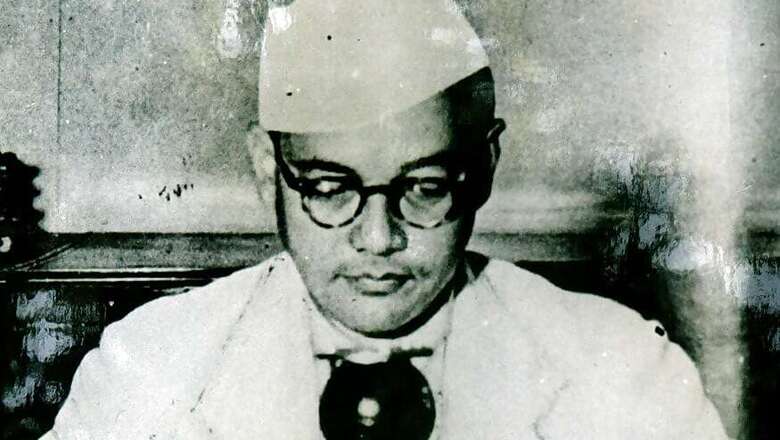
views
Netaji Subhas Chandra Bose is the forgotten hero of India's freedom struggle. Once an integral part of the Congress, he broke with Mahatma Gandhi and Jawaharlal Nehru and fought bitterly with Sardar Patel. Bose rejected non-violence and joined up with the Japanese and the Nazis to fight the British in World War II. He was no Nazi himself, but he believed that the only hope for Indian independence lay in the defeat of the British Empire.
As we know, the British and their allies actually won the Second World War. But even as the British army was closing in, the Japanese announced that Bose died in a plane crash. But did he, really? To this day millions of Indians continue to believe that Bose survived and escaped the advancing British army.
Perhaps the government of India knows the truth about what really happened to Netaji. Perhaps the solution to this mystery lay in the government's Netaji files. But we never had a chance to find out because the Netaji files were classified top secret and locked away. Then, around six months ago Prime Minister Narendra Modi finally agreed to release the secret files.
There is an official version of Netaji's death. According to this, Netaji flew out from Taiwan on August 18, 1945. The plane broke into two while taking off. Netaji was badly burned in the crash. He died a few hours later in a local hospital. His body was cremated within two days. His ashes were taken to Tokyo where they still remain in the Renkoji Temple. First of all, many of Netaji's lieutenants who accompanied him on his travels were not allowed to get on the plane with him. They never saw Netaji's body. There are no photographs. And there is no death certificate.
Could it be, ask the sceptics, that the crash was staged? Or could it be that Netaji survived the crash? The Second World War was ending, the British army was advancing. Could Netaji's allies, the Japanese, have helped him escape, either by staging the crash or by concealing the fact that he survived?
It sounds like a full-fledged conspiracy theory. And of course it is. But like the theories about JF Kennedy's assassination, it is plausible enough to create genuine doubts. And there is one more factor.
When successive governments in India -- including those run by the BJP -- refused to release the secret files on Netaji's disappearance, they never explained the need for so much secrecy. Whenever questions were asked, the answer was the same: the release of these files would affect relations with friendly foreign nations. And yet, there is nothing new in any of the files which have been finally released.
Which, in itself, is another mystery. If the files were so routine, then why did every government refuse to release them? And the conspiracy theories have continued unabated. Here is a brief run-down of possible solutions to the mystery.
The first theory is that Netaji fled to Russia. There is some evidence that he was on good terms with the Russian dictator Josef Stalin. It has been suggested that Stalin, who had contempt for Mahatma Gandhi and Jawaharlal Nehru, had some use for Netaji. He offered him asylum and then intended to send him back to India.
Except that Stalin did no such thing - he never sent Netaji back!
And every time the Indian government refused to release the files citing their impact on relations with foreign countries, the conspiracy theorists took this to refer to relations with Russia. It was proof, they said, of the Stalin connection.
The second theory is that Netaji did actually return to India. But he did this in secret. He never told anyone that he was Netaji, assumed another identity and died in 1985.
But in 2005, after six years of investigation, the Manoj Mukherjee Commission, appointed by the government of India, said that Netaji did not die in an air crash in Taiwan. In fact, the Commission said there was no air crash that day. And in a sensational twist, Justice Mukherjee drew attention to a mysterious sadhu called Gumnami Baba, who many people believe, was Netaji in disguise. The government of India rejected the report. But Justice Mukherjee had seen the secret files. Did he know something the rest of us did not?
His closest surviving relative, his daughter Anita Bose, is contemptuous of the Gumnami Baba theory. In January, as interest in Netaji mounted with the release of the secret files, she talked to CNN-News18's Zakka Jacob
Anita Bose: If we could get the DNA extract from the remains kept at the Renkoji temple and that could prove that it was his remains, at least that would make it very likely that he died in that plane crash.
Zakka Jacob: You have been suggesting this DNA test for a number of years now. Why do you think successive Indian governments have been reluctant to do that?
Anita Bose: Maybe the Indian government was reluctant to ask the Japanese government because they felt they would be uneasy about it or feel insulted.
Of all the people who have researched Netaji's disappearance, none has been as tenacious as journalist Anuj Dhar. He has authored several books on the mystery, and even runs an NGO called Mission Netaji.
Vir Sanghvi: Is there anything in the files that confirms the view that Netaji was alive and would have returned to India after the plane crash?
Anuj Dhar: The oldest file is from 1951-52. You would see that in 1951-52, Panditji is writing a note on this file and these notes are available. He's completely against any inquiry into Subhash's death and he says that. 'look, Subhash Chandra is dead . Thereafter we find , what we call a cut-and-paste method. Any home secretary and foreign secy whose name comes on the seal, would not dare go against Panditji's words.
Vir Sanghvi: The Justice Mukherjee Commission took the line that Netaji did not die in the plane crash. Is that correct?
Anuj Dhar: These files were seen by Manoj Kumar Mukherjee and he has given his verdict that the evidence is very fudgy. It shows that this man probably did not die and he had escaped to Russia.
Vir Sanghvi: So, let's assume what he said is accurate. You believe that even if there was plane crash...
Anuj Dhar: No, there was no plane crash. There was no plane crash
Vir Sanghvi: So, when does Gumnami Baba appear?
Anuj Dhar: Gumnami baba then appears in India in '55-56. Nobody knows anything about him. All we know is Sampoornand who was at some point of time, the chief minister of UP, was in contact with him. For 30-40 years, a man like him is in India and in different parts of UP - he was in Lucknow, he was in Basti, he was hiding in all these places. Now, three possibilities are very clear to me. If a man of that stature is alive in India, there's no way the governent would not know. Especially, given the kind of thing the IB does in India, they would find out one day or the other. They did. Number two, if he's SC Bose, there has to be a hell of a lot of reason for him to not come out . Number three, if he's SC Bose, then he cannot keep quiet. Its not par't of his DNA.
Vir Sanghvi: But the big question is why would Netaji return to India and pretend to be a baba and live in isolation? Not contact his family, not declare himself, not contact his friends?
Anuj Dhar: Well, Suresh Chandra Bose, Netaji's elder brother, who was alive at that point of time, deposed before the Khosla commission on record , "My brother is alive till date.' The records are available.
Vir Sanghvi: But, he never mentioned Gumnami Baba?
Anuj Dhar: You have some evidence from Faizabad. Suresh Bose's handwritten notes have been found from Faizabad. The original summons was issued to Suresh Bose by Khosla Commission, the copy's lying in Faizabad. It's not possible. Either this man stole it, or somebody gave it to him.
Vir Sanghvi: What about Netaji's daughter? She's openly skeptical about this theory?
Anuj Dhar: Well, Netaji's daughter was barely two years old when her father reportedly died. We have on record statements made by her mother, who knew everything. Emilie Schenkl passed away in 1996. She was very intelligent. She clearly said. 'he's not my husband'. In fact, there was a proposal made by the government of India in October 1995 that, a few months before she passed away, the ashes from Renkoji temple be brought to India. She refused point blank.
Vir Sanghvi: Isn't it odd that his daughter would be scoffing of this?
Anuj Dhar: The mother said very clearly he did not die and the daughter is supporting the plane crash story theory, after India's foreign minister. So I find a lot of things which are very hanky panky.
Vir Sanghvi: Why would Netaji have to come back in hiding? That's the key question.
Anuj Dhar: There was no such thing called the Gumnami Baba. This man smokes cigars, he used to talk in English, he used to talk about intelligence, security what not. But what Indira Gandhi is doing, what that man is doing ,and so on and so forth. So he was not a baba, as we understand the term. He used to be asked this question that why are you not coming out. and he would say that it is not in India's national interest. People of this country would suffer if I came out. Then, he had given an account of exactly what happened. Well, he had a lot of problem in the manner this country got freedom. He had a problem with India's joining the Commonwealth because SC Bose, as we understand him, had problem with Gandhiji that India must never become a part of the Commonwealth because we have suffered so much under them. He said India was not a free country and he would also say the transfer of power documents be made public in entirety. You would know why he had to go into hiding.
Vir Sanghvi: What is the reason for believing that he was Netaji?
Anuj Dhar: First of all, the handwriting expert's opinion. It's scientifically not possible for a man to copy somebody else's handwriting in two languages for 30 years. I have known for 15-16 odd years people who claim this man was him. I see no reason why not to believe him. They have been telling the truth. So that's there. The writing which has survived him also talks about things we have - a declassification of the file about the INA treasure.What happened to that treasure? Whatever is there in that file, which has been declassified in 2016, this man is talking in '60s.
Vir Sanghvi: So there's an inquiry commission coming up, looking into Gumnami baba and who he was? And you've got how many more files to be declassified?
Anuj Dhar: As of now, there are some 100-odd files which are going to be declassified.
Vir Sanghvi: Do you expect anything to come out of that
Anuj Dhar: Not from these 100 files. Probably, there will be one file where there will be mention of something scandalous on Subhas Bose's personal life. That's the only thing I know of. What I have understood after going deep into this for so many years, is that there are two types of files that the GOI holds. The files they accept on record even before courts of law. There are certain files or information that is so highly secretive, they would never admit.
Vir Sanghvi: But tell me if this was all in the files, why were the successive governments been so reluctant in releasing them?
Anuj Dhar: That's the answer to my question. If there was nothing, then why would they keep them secret. Because they are holding something else.
Vir Sanghvi: You're familiar with the conspiracy theories surrounding Netaji's death. Do you, as somebody who has studied the subject in such detail, believe in any of them?
Rudrangshu Mukherjee: Whatever there is in the public domain, as a student of history, I can draw my conclusions from those documents. It is very clear that he died in that plane crash in Taipei because there are interviews of the nurse who looked after him, there's an interview of a person, one of his closest comrades, who was in the flight with him and actually saw him coming out of the aircraft with clothes on fire. So there is no reason to doubt this evidence.
Vir Sanghvi: So, why then was so many governments so reluctant to release or declassify these files? Even this government in a parliamentary answer, even before they declassified them, said it would hurt our interests with friendly countries if we released them?
Rudrangshu Mukherjee: You know what? This is a complete mystery. There was already a recorded attempt to assassinate Subhash Bose and that file is in the public domain. That hasn't harmed our relationships, as it is, with UK. Why should something else harm the relationship? I mean I don't know, and I really can't see what role this, which is peddled now, that Soviet Union has something to do with it.
Vir Sanghvi: This whole Gumnami Baba hypothesis. Does that make any sense to you, because UP govt will now do an inquiry upon it apparently?
Rudrangshu Mukherjee: I don't think so...that's not my reading of Bose, the man. With all his flaws - pro-fascism, shaking hands with Hitler, going to the Japanese, all of which I find quite despicable - he was a genuine patriot. He genuinely believed that he should do something for India. And he did all these things which we now disagree with, because he thought this would lead to India's freedom and India's independence. I mean one should grant him that. Even his critics should grant him that.
Vir Sanghvi: Why do you think this conspiracy theory survived for so many decades?
Rudrangshu Mukherjee: Well, most of these conspiracy theories, as you probably know, arise from Bengal where Bose is the great icon. I mean he has been the greater icon than Sourav Ganguly, Amartya Sen, Mamata Banerjee - or all of them put together. Bose is the bigger icon, and there is, or there used to be a very genuine belief among educated Bengalis that Bose was done in within the Congress by Gandhi and Nehru. That there was a genuine fear of Bose within the Congress leadership and this is why they did away with him when they got the chance,so that he wouldn't emerge as a rival to Nehru or Patel, or somebody like that
Vir Sanghvi: So, do you think in a way it's a bit sad that whatever interest it appears to be now in Bose among today's generation does not rest on his political legacy or his life or whatever. But, largely on a question - did he die in a plane crash?
Rudrangshu Mukherjee: Yeah. Exactly. This is the really sad part of it, you know, that man is alive because of his death. But there are episodes, particularly when INA is retreating from the North East Frontier - and the Japanese had deserted the INA because the tides of war had completely turned against them - when Bose actually behaves like a hero.
Vir Sanghvi: And you think we just played down that now because we don't even talk about it?
Rudrangshu Mukherjee: Well, you know people think of it as this kind of fugitive who had supernatural powers who could disappear from anywhere he wanted. i think Bose's so-called admirers do him a great disservice by playing up this conspiracy theory, concentrating on his death, rather than the actual work that he did.

















Comments
0 comment